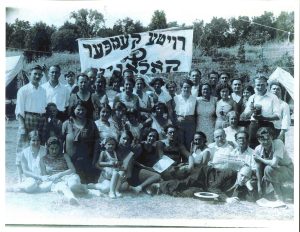TORONTO — It was a day of extreme sadness, emotional stress and tears fitting the solemnity of Yom Hashoah.
But that didn’t stop American-born, award-winning actor Tom Dugan from using a delicate brand of humour in an engaging and eloquent performance that depicted a man who dedicated his life to seeking information and tracking down fugitive war criminals.
Dugan was Nazi-hunter Simon Wiesenthal.
An Irish Catholic son of a decorated U.S. soldier who helped liberate Buchenwald, one of the largest concentration camps in Germany in 1945, Dugan had an interest in history and the horrors of death camps.
Now 51 years old, Dugan didn’t hesitate when the opportunity came to write a two-hour script and then perform the role of the Austrian-born Holocaust survivor in the play, Nazi Hunter – Simon Wiesenthal.
After a morning performance at the Toronto Centre for the Arts before some 500 Grade 7 to 12 students from schools across Ontario, Dugan was brilliant again for an evening crowd that included survivors and children of survivors.
Sponsored by Friends of Simon Wiesenthal Center for Holocaust Studies, the production used a stage that simulates the infamous Jewish Documentation Center in Vienna. The setting was Wiesenthal’s retirement day, and he recalled stories in a masterful solo performance, with wit, humour and brilliant acting.
Dugan recounted the story of Wiesenthal and how he cheated death while being tormented by Hitler’s SS, and then dedicated his life to bringing to justice many mass murderers. While packing up his files in 2003, Dugan gives a remarkable depiction of Wiesenthal and his stories before he left the war behind and his office material boxed and ready for transportation to a Los Angeles museum.
“Although progress has been made since those horrible days of the Nazis, there is work still to be done, and I felt an obligation to pass on the important lessons learned from the generations of the past,” Dugan said in an exclusive interview with The Canadian Jewish News.
“I would never have written this show if Wiesenthal didn’t have a magnificent sense of humour – he was a comic before the war,” Dugan said. “It had to be made in a presentation style that was palatable and entertaining, to conquer a tough subject.
“Look, some people thought this would be a drag – long, boring, same old stuff. While humour really works with young crowds, the subject had to be broached in a way that didn’t turn people off, but got people to absorb the message.”
To become a Wiesenthal look-alike, Dugan had to add padding that would make him look 50 pounds heavier. It also meant shaving part of his full head of hair to resemble Wiesenthal’s baldness and then studying with a dialect coach to match his Austrian accent.
“This is not a play about history, it’s a play about now and tomorrow. Humanity is struggling now with the things that happened in the ’30s and ’40s, and we need to do everything possible to make sure this doesn’t happen again,” Dugan said.
“There were something like 22,000 criminals, and I helped catch 1,100, about five per cent,” Dugan said in the performance. “I‘m ashamed of that small number.”
Dugan had several lines that sparked mixed reaction.
“Austria is a beautiful place, the skiing is great, but they don’t mention how many Jews were killed there.” And, “They called me the Jewish James Bond,” or, “I like it when one Nazi tells another – I will tell Simon Wiesenthal about you.”
Eden Granovsky, a 10-year-old student at the Toronto Heschel School, thought Dugan’s decision to use humour was a smart move.
“[The humour] kept me engaged and not feeling so sad,” Eden said. “ It was like finding a treasure of valuable knowledge that added to what I know about the Holocaust.”
Max Abrams, also 10, had a similar reaction. “Thought it was outstanding and very touching,” he said. “I now have a better understanding of what my grandfather went through.”
And Czech-born Helena Fine, the recipient of a special award from the Friends of Simon Wiesenthal Centre before the performance, gave it a thumbs-up.
“It was a wonderful performance with moments that I got to know Wiesenthal much more than I had known,” said Fine, whose mother was a Holocaust survivor. “The message is to learn and keep educating the young. Life goes on, and I don’t think we should continue to be so sombre.”
Yet, 83-year old Alexander Eisen, who escaped the Budapest ghetto and went on to write a book of his memoirs called A Time of Fear, said, “I respect [Dugan’s] artistic talent, but I would have appreciated more of a historical speech, more of a serious theatrical performance. I didn’t laugh. I survived the Holocaust.”






